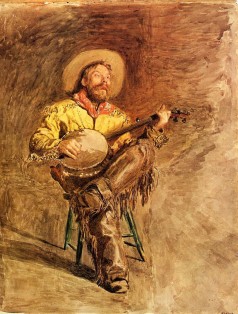Once in San Antonio, recalls Colonel Jack Potter in Floyd Streeter’s The Kaw, he applied to Ab Blocker for a job. The famous trail boss asked him: “Can you ride a pitching bronc? Can you rope a horse out of the remuda without throwing the loop around your own head? Are you good natured? In case of a stampeded at night, would you drift along in front or circle the cattle to a mills? …Just one more question: can you sing?” As Jack Potter learned to his dismay, the cattle couldn’t stand his singing. Every time he went on guard and san, the cattle would get up and mill around the bed ground. But as soon as Ab Blocker began singing, the cattle commenced to lie down. Potter was fired. Another old-timer , Edward Charles Abbott was more successful. He could not only sing but also make up verses – “anything that came into your head.” He had a hand in composing the Ogallaly Song”, as he tells in We Pointed Them North. This was “just made up as the trail went north by men singing on night guards, with a verse for every river on the trail,” starting form the Nueces in Texas and ending with the Yellowstone in Montana. “When I first heard it it only went as far as Ogallaly on the South Platte, which is why I called it the Ogallaly song.” Considering that so few cowboys could sing and that it wasn’t the quality of the singing that counted – just the reassuring sound of a familiar voice or even a humming or whistling or yodeling – it is a wonder that cowboy songs are as good as they are. As a matter of fact, most cowboy songs, especially cowboy ballads, were written by known cowboy poets, to older tunes. Everyone sing along with me “As I was walking one morning for pleasure, I spied a young cow puncher riding alone, his hat was thrown back and his spurs was a jingling as he approached me a singing this song. Whoop-ee ti-yi-yo, git along little dogies, it’s your misfortune and none of my own. Whoop-ee ti-yi-yo, git along little dogies, for you know Wyoming will be your new home.” 
Follow Me
© 2025 Chris Enss | Privacy Policy | Design by Winter Street Design Group | Login

